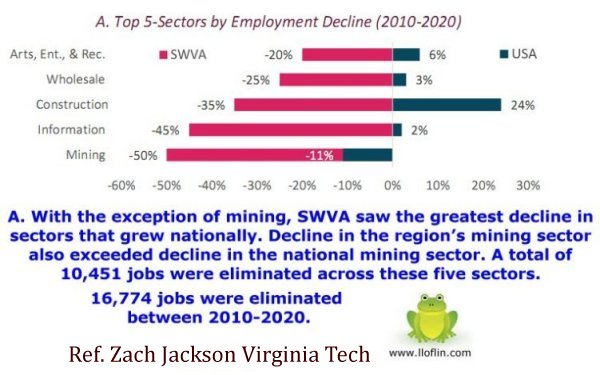

Southwest Virginia Job Losses 2010-2020
By Lewis Loflin
In 2015, Scott County, Virginia, welcomed TTEC (formerly TeleTech) with hopes of economic revival, expecting 300 call center jobs to counter decades of job losses. A $300 million fiber optic investment promised high-tech growth for Southwest Virginia, yet by 2025, the region has shed significant employment—information-sector jobs down sharply since 2010. As I’ve noted in TICR Failures and Bristol’s Debt, public funds often yield fleeting benefits. This article examines TTEC’s impact in Scott County, its modest outcomes, and lessons for a region facing poverty and decline.
The Tri-Cities, grappling with issues like meth addiction and failed energy projects, needs sustainable jobs, not temporary fixes.
In October 2015, TTEC announced a Weber City call center, projecting “ultimately” 300 jobs (Kingsport Times News, Oct. 21, 2015). The project secured $745,000 in taxpayer incentives, free land along US 23, and Virginia Jobs Investment Program funds. Del. Terry Kilgore praised it as transformative, but progress stalled—by May 2016, construction had barely begun. TTEC temporarily operated from Duffield’s Pioneer Center, a site with its own history of unmet promises, as I detailed in Boucher’s Legacy.
Kilgore’s claim of TTEC’s “first” Virginia site was incorrect; TTEC already ran centers in Clifton Forge, Martinsville, Hampton, and Arlington by 2022, per TTECjobs.com.
TTEC’s history suggests job shuffling, not creation:
The Texas layoffs preceded Scott County’s opening, hinting at relocated roles. TTEC’s 450 hires in Overland Park, Kansas, in 2022 (Kansas City Business Journal, May 2, 2022) further show mobility. Stock volatility—peaking at $110 in May 2021, falling to $51 by September 2022, stabilizing near $45 in 2025 (Yahoo Finance estimate)—signals instability, a concern for Scott County’s long-term hopes.
TTEC’s wages, listed at $11.50-$16/hour in 2022 (TTECjobs.com), averaged $12.50 in 2015 per officials—near the 1970 minimum wage’s 2025 equivalent ($12.63, adjusted from 2018’s $10.46 at 3% inflation). PayScale.com noted $14,000-$23,000 annually in 2014, reflecting low-end roles, many now work-from-home. Scott County’s 18% poverty rate and 7.1% population drop (2010-2018) highlight these jobs’ limits. By September 2022, no Weber City openings appeared, only at TTEC’s other Virginia sites.
The region has been replacing manufacturing jobs with call center jobs...easily moved to other regions and/or countries. —LENOWISCO Broadband Study
Like Bristol’s low-wage retail in Minimum Wage, these jobs offer little stability.
The Pioneer Center in Duffield, costing millions, promised 125 jobs via Results Network in 2005 but closed soon after. Repurposed as office space, it briefly housed TTEC. Building anew in Weber City, despite Duffield’s availability, questions planning, a pattern I’ve critiqued in Energy Center. Public funds prop up projects, yet outcomes fade, leaving Scott County in a cycle of hope and disappointment.
Del. Terry Kilgore, TICR chair, championed TTEC, but the commission’s history raises doubts. A 2011 audit, cited in TICR, found 89% of grants untracked, with projects like Gretna’s biofuel nursery failing. The $300 million fiber optic initiative improved broadband but not jobs, as LENOWISCO noted. This mirrors Bristol’s $47 million Falls debt (Debt Crisis), where incentives outpaced returns.
In 2025, Scott County’s TTEC center operates below its 300-job goal, joining failed call centers in Wise and Dickenson, as I noted in Wise Jobs. Southwest Virginia’s job losses—over 60,000 since 2009—persist, with call centers offering short-term relief at best. The Hard Rock Casino’s 2024 opening in Bristol may boost taxes, but Scott County’s 18% poverty and population decline demand more. Sustainable growth, not quick fixes, is critical.
Scott County can chart a better course:
| Action | Benefit |
|---|---|
| Transparent incentives | Ensures accountability |
| Skill-based training | Creates lasting jobs |
| Local business support | Strengthens economy |
| Community engagement | Aligns with needs |
Investing in people, as I urged in Meth Epidemic, outperforms fleeting projects.
Scott County’s TTEC venture reflects Southwest Virginia’s struggle for meaningful employment. In 2025, leaders must prioritize stable, well-paying jobs over temporary incentives, building a future that lifts the Tri-Cities’ resilient communities.
Acknowledgment: I’d like to thank Grok, an AI by xAI, for helping me draft and refine this article. The final edits and perspective are my own.